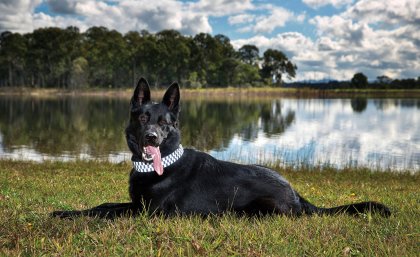
German shepherd PD Maui and his canine colleagues are lean, keen policing machines, thanks to important surgery at The University of Queensland’s Gatton campus.
The UQ Veterinary Medical Centre Small Animal Hospital is treating Queensland Police Service dogs to minimise their risk of developing gastric dilatation and volvulus (GDV).
Police Dog Maui has had laparoscopic surgery to prevent GDV, a life-threatening condition that requires emergency veterinary treatment.
Animal surgery senior lecturer Dr Jayne McGhie said GDV, also known as bloat, occurred when the stomach became dilated and twisted into an abnormal position.
Dogs can die quickly without prompt medical attention.
“GDV is common in large, deep-chested dogs such as great danes, German shepherds, weimaraners, setters and standard poodles,” she said.
“High drive dogs such as working dogs, anxious dogs, dogs that eat rapidly and dogs with a first-generation relative that have had the condition are at higher risk,” Dr McGhie said.
The Brisbane Dog Squad’s PD Maui had his day surgery at UQ’s Veterinary Medical Centre Small Animal Hospital, where he was treated by a team of veterinary surgeons, anaesthetists and nursing staff.
“The procedure, known as a gastropexy, creates a permanent attachment between the stomach wall and the body wall to reduce the risk of the stomach twisting,” Dr McGhie said.
“We perform this surgery on dogs such as police or military working dogs and other at-risk dogs to greatly reduce their risk of developing GDV at some time in their life.
“This is an elective procedure, performed when the dog is healthy and at a time that suits the Police Dog Squad to have one of a handlers and their dog rostered off duty.
“Surgeons insert a small-diameter laparoscope into the abdominal cavity via a small cut in the abdominal wall.
“This alleviates the need for large open incisions which are more painful and take longer to heal.
“The dogs are discharged the same day, have less pain because they have very small surgical incision sites, and police and military working dogs have less time off work,” Dr McGhie said.
Video Interviews (of the humans involved) and images of PD Maui with veterinary and police staff are available at the Queensland Police Service blog.
Media: UQ Faculty of Science, Karli Kollegger, +61 (7) 5460 127, +61 (0)488 780 229; Queensland Police Service, Heidi Eiser, + 61 (7) 3364 4618. eiser.heidim@police.qld.gov.au .
About UQ’s Small Animal Hospital
The Small Animal Hospital is part of UQ’s $100 million investment in state-of-the-art School of Veterinary Science facilities at Gatton in the Lockyer Valley. The hospital operates as a referral small animal and equine veterinary facility and a leading teaching facility for veterinary students.
About the Queensland Police Service Dog Squad
The Queensland Police Service Dog Squad is an integral arm of effective, statewide policing. Handlers and their dogs spend hours together training, working and living, establishing a formidable partnership to combat crime. The QPS initiative to perform prophylactic gastropexy surgery on these dogs illustrates the commitment to the longevity of this very special bond. The QPS has 68 general purpose dogs, five firearm and explosive detection dogs, 11 drug detection dogs and four human remains detection dogs operating throughout the State.
.jpg)











